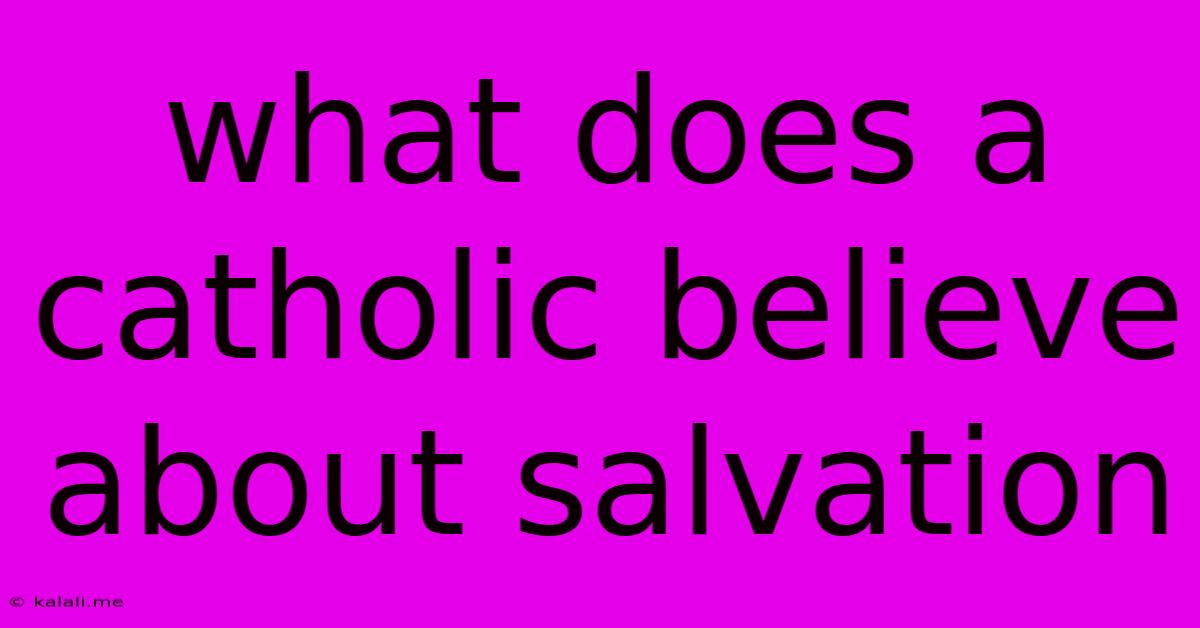What Does A Catholic Believe About Salvation
Kalali
Jun 07, 2025 · 4 min read

Table of Contents
What Does a Catholic Believe About Salvation?
Salvation, the journey from separation from God to union with Him, is a central tenet of the Catholic faith. It's a complex and multifaceted concept, encompassing not just the afterlife but also a transformation of life here on Earth. This article explores the Catholic understanding of salvation, covering its key aspects and addressing common misconceptions.
Catholics believe that salvation is a gift freely given by God, a consequence of God's immeasurable love and mercy. It is not earned through human merit alone, but rather received through faith in Jesus Christ and participation in the sacraments. This process, however, actively involves the individual, requiring cooperation with God's grace. This intricate interplay of divine grace and human effort is crucial to understanding the Catholic perspective on salvation.
The Role of Jesus Christ in Salvation
At the heart of Catholic belief about salvation lies the person and work of Jesus Christ. Catholics believe that Jesus, being both fully God and fully human, lived a perfect life, suffered, died, and rose again to conquer sin and death. His sacrifice on the cross is understood as the ultimate act of atonement, reconciling humanity with God. This sacrifice is not merely a symbolic gesture but a real and effective act that makes salvation possible. Jesus' death and resurrection are considered the pivotal events that make salvation attainable.
The Importance of Grace and Free Will
Catholic theology emphasizes the crucial role of God's grace in the process of salvation. Grace is understood as God's unmerited favor and assistance, enabling individuals to respond to God's call and cooperate with His plan. This grace is not imposed upon us, but freely given and requires our active cooperation. This is where free will comes in. Catholics believe that God respects human freedom, and salvation requires a conscious and willing response from the individual. We must choose to accept God's grace and follow His teachings. This collaboration between divine grace and human free will is often described as a "co-operation" in the work of salvation.
Sacraments and Salvation
The seven sacraments – Baptism, Confirmation, Eucharist, Reconciliation (Confession), Anointing of the Sick, Holy Orders, and Matrimony – are essential elements in the Catholic understanding of salvation. Each sacrament is a visible sign of God's grace, offering specific means of receiving and growing in that grace. For instance, Baptism cleanses us from original sin and incorporates us into the Church. The Eucharist (Holy Communion) offers spiritual nourishment and strengthens our union with Christ. Reconciliation offers forgiveness for sins committed after Baptism. These sacraments aren't merely rituals but powerful channels of God's grace, essential for spiritual growth and the journey toward salvation.
Heaven, Purgatory, and Hell
Catholic teaching distinguishes between different destinies after death: Heaven, Purgatory, and Hell. Heaven is the ultimate state of perfect union with God, experienced as eternal joy and bliss. Purgatory, according to Catholic belief, is a state of purification after death for those who die in God's grace but still have temporal punishment to undergo for their sins. This purification allows them to attain the holiness necessary for Heaven. Hell is the eternal separation from God, the consequence of freely and definitively rejecting God's love and grace. Understanding these three possibilities helps to contextualize the Catholic understanding of the ultimate goal of salvation: complete union with God.
Ongoing Sanctification
Salvation is not simply a single event but an ongoing process of sanctification, a journey of growth in holiness. Catholics believe that even after receiving salvation, believers are called to continue striving for virtue and holiness throughout their lives. This ongoing pursuit involves prayer, participation in the sacraments, acts of charity, and living according to God's commandments. It's a life-long process of deepening one's relationship with God and becoming more Christ-like.
In summary, Catholic belief about salvation emphasizes the free gift of God's grace received through faith in Jesus Christ, the importance of human cooperation, the role of the sacraments, and the ongoing process of sanctification. It is a holistic understanding of salvation, encompassing both our earthly lives and our eternal destiny.
Latest Posts
Latest Posts
-
How To Check A Leg Kick
Jun 07, 2025
-
Is It Normal For Queen Ants To Drink Water
Jun 07, 2025
-
Do You Have To Fight Undyne Before Befriending Her
Jun 07, 2025
-
How To Get Out A Broken Screw In Metal
Jun 07, 2025
-
Do You Have To Seal Quartz
Jun 07, 2025
Related Post
Thank you for visiting our website which covers about What Does A Catholic Believe About Salvation . We hope the information provided has been useful to you. Feel free to contact us if you have any questions or need further assistance. See you next time and don't miss to bookmark.